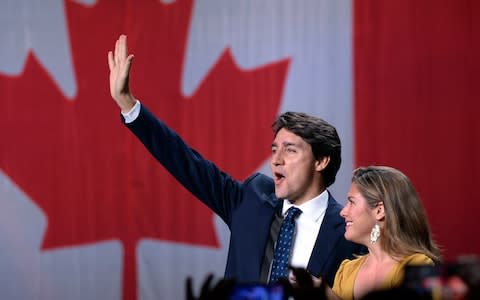Justin Trudeau wins second term in Canada elections but loses majority

Justin Trudeau has won re-election, but without a parliamentary majority after a close-run race in which the Canadian prime minister faced several scandals.
Mr Trudeau did better than predicted, but secured just 33 per cent of the national vote, compared to 35 per cent for the Conservative opposition – the lowest a government has held in Canadian history.
The Liberals won 157 of the nation's 338 electoral seats, versus 121 for the Conservatives led by Andrew Scheer.
“Canadians rejected division and negativity – and voted in favour of a progressive agenda and strong action on climate change,” Mr Trudeau said at a victory rally early Tuesday morning in Montreal. “For those who did not vote for us, we will govern for everyone. We will fight for all Canadians.”
The prime minister broke tradition by delivering his remarks while Mr Scheer was addressing his supporters, rather than waiting for the Conservative leader to conclude his speech.

It capped what was a nasty electoral battle between Canada’s two main political parties that were locked in a dead-heat in polling throughout the 40-day campaign.
Mr Trudeau's Liberals will likely rely on the left-leaning New Democrats (NDP) to form a new government and pass legislation. NDP leader Jagmeet Singh said early Tuesday he had congratulated Trudeau and vowed to play a constructive role in Parliament.
The results will have been a relief for Mr Trudeau, who was hit with a major scandal midway through the election when several photos of him wearing blackface before he took office emerged. The 47-year-old leader, who came to power in 2015 on a wave of goodwill, also faced a sense of fatigue among the electorate.

Mr Trudeau also was hurt by a scandal that erupted this year when his former attorney general Jody Wilson-Raybould said he pressured her to halt the prosecution of a Quebec company. Mr Trudeau has said he was standing up for jobs
Mr Scheer said that “Conservatives have put Justin Trudeau on notice,” and vowed that when the Liberal governments falls, the Tories “will be ready and we will win.”
But the results were seen as a blow for Mr Scheer, a career politician who lacked the charisma of his rival.
"He's gone," Robert Bothwell, a professor of Canadian history and international relations at the University of Toronto, told Associated Press. "He ran a really dirty campaign. There is nothing to be proud of on his side. He had the opportunity and blew it."
One clear winner from the election was the Bloc Québécois, a nationalist, traditionally sovereigntist party in the French-speaking province of Quebec, which more than tripled its seats to 32, to become the third party in parliament, displacing the NDP, which looked set to lose seats from 39 to 24.

Mr Singh, a turban-wearing Sikh, faced a formidable challenge in Quebec, where the provincial government this year passed a controversial secularism bill that bans public workers, such as police officers and teachers, from wearing religious symbols.
One surprise was the relatively poor showing of the Green Party of Canada, which only added one additional seat it to bring its parliamentary total to three, including leader Elizabeth May’s.
Ms Wilson-Raybould, Canada’s first Indigenous attorney general, held onto her seat in British Columbia, which she won as a Liberal in 2015.
Canada’s 43rd general election campaign will be remembered as a contest short of “big ideas” or any discussions on such major issues as the future of healthcare, deficit reduction, trade or Canada’s relationship with allies, such as the United Kingdom, or healing rifts with other countries, namely China, said Conservative commentator Tim Powers.
Instead, Mr Powers said, Canadians witnessed “mechanised politics,” where the main political parties “catered toward certain segments of the electorate,” with the Liberals pushing subsidised camping in national parks and the Tories promoting tax credits for home renovations.
Frank Graves, president of Canadian polling firm EKOS Research, said the deep partisanship witnessed in the United States crept into Canada during the 2019 election campaign.
“There is very little centre ground within the intensely polarised Canadian electorate,” he said.
US President Donald Trump, who has clashed with Mr Trudeau over trade, tweeted his congratulations early Tuesday, saying, "Canada is well served."
Canadian voters were largely left unimpressed by the campaign.
Uche Odiatu, a 56-year-old dentist in Ottawa voted Liberal and was pleased that the party will hold onto power. But he added that Mr Trudeau “has to work very hard now to get the west feeling heard and to break through the misconceptions about him.”
The Liberals, who have brought in a 5 per cent carbon tax, lost all four of its seats in oil-rich Alberta, a province that will now be represented by mostly Tory MPs, save one district held by the NDP.

 Yahoo News
Yahoo News 
